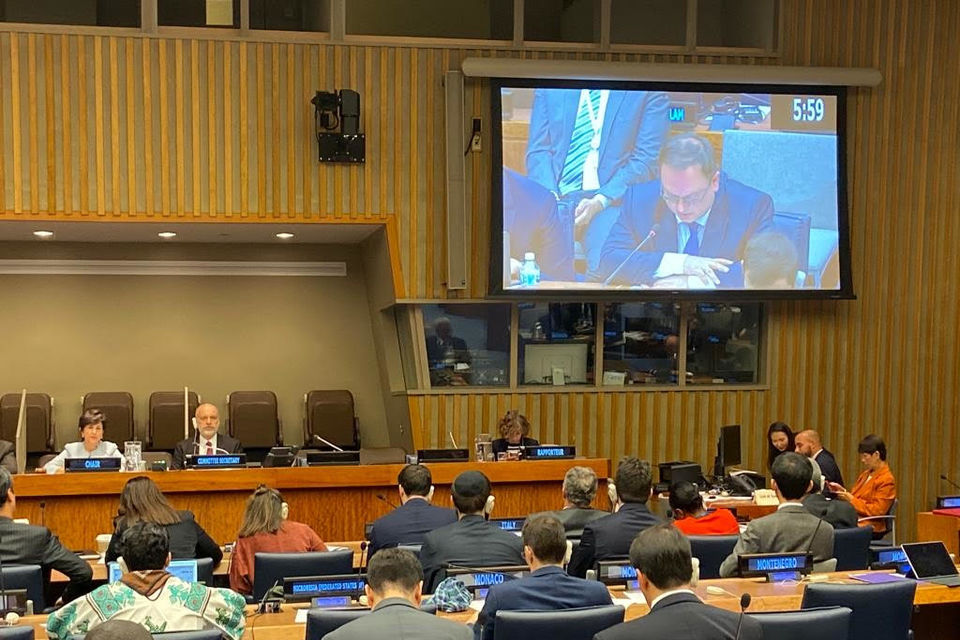Statement by the delegation of Ukraine at the UNGA First Committee general debate

As prepared. Check against delivery.
Mr. Chair,
On behalf of the delegation of Ukraine, allow me to congratulate you and other members of the Bureau on your election.
We consider the UNGA First Committee as a very important universal mechanism of the current disarmament toolbox. Ukraine reiterates its consistent adherence of the multilateral approach in this sphere.
Ukraine stands alongside with those states that are ready to contribute to the strengthening the NPT regime, as the latest trends demonstrate the need to take measures for the prevention of a weakening of the Treaty.
I would like to recall that on August 2, 2019 we lost the INF Treaty, another cornerstone of global arms control regime, after the United States withdrew from it because Russia failed to return to compliance with the Treaty. We are deeply concerned that the termination of the INF Treaty could lead to the increase of a build-up of nuclear and conventional missiles along Russia’s border near the NATO’s Eastern flank that will have the destructive impact on the European security.
Mr. Chair,
Ukraine is a vivid example of inefficiency of “security assurances” provided by the nuclear-weapon states in exchange of decision to get rid of powerful nuclear arsenal. The Budapest Memorandum of 1994 politically bounded Ukraine’s denuclearization to the respect for its territorial integrity by the nuclear powers. Continued violation of this commitment by Russia will not encourage proliferators to take steps towards nuclear disarmament. Quite the contrary – such an example would contribute in favor of a nuclear deterrent as a remedy for both nuclear and conventional military threats.
Mr. Chair,
Ukraine continues to support the development of the IAEA safeguards system and calls on all NPT Parties that have not yet done so, to conclude and strictly implement comprehensive safeguards agreements with the IAEA and to conclude and put into effect Additional Protocols.
The implementation of safeguards by Ukraine is carried out in strict conformity with the international law, Statute of the Agency and Agreement between Ukraine and the IAEA for the Application of Safeguards in connection with the Treaty on the Non-Proliferation of Nuclear Weapons as of 1995 and Additional protocol thereto as of 2000. Hence, all facilities and nuclear material in Crimea continue to be covered by the said Agreement and Additional Protocol.
We support the IAEA’s stable and coherent approach, which has reliably proved that the framework of the Agency will never be used for impudent attempts to recognize any alteration of the status of Crimea.
We would like to recall that any Russia’s efforts to extend its jurisdiction under the Agreement of 1985 between the IAEA and the USSR over the nuclear facilities and material in Crimea shall be deemed null and void.
Mr. Chair,
Reiterating its support of the multilateral approach in the sphere of disarmament and non-proliferation, Ukraine underlines the importance of the Comprehensive Nuclear-Test-Ban Treaty universalization, negotiating and concluding the Fissile Material Cut-Off Treaty (FMCT) within the Conference on Disarmament framework and creation of nuclear weapon free zones including such a zone in the Middle East.
Ukraine also recognizes key role of conventional arms control instruments, including Convention on Certain Conventional Weapons, Anti-Personnel Landmines Convention and UN Programme of Action on illicit trade in SALW.
Mr. Chair,
The illicit trafficking of conventional arms is fueling global terrorism and conflicts and constitute serious impediments for peace, security, stability and development.
The Russian military aggression against Ukraine with the use of regular military forces armed with modern types of conventional armaments and ammunition has significantly damaged the existing system of conventional arms control. In this context, it is of great concern that in 2019 the Russian Federation has been continuing its massive transfers of military goods to the Eastern Ukraine, through kremlin-controlled channels thus deliberately destabilizing the situation in our country and totally ignoring the international community calls to establish the effective control. We have no right to disregard the illicit supplies of conventional weapons from the Russian Federation to Ukraine.
Moreover, the Russian footprint in Crimea and the Azov-Black Sea looks threatening. We see how the Black Sea area is gradually turned by Russia to a military playground with occupied Crimea converted to a heavily militarized fortress.
In this respect, let me recall the UNGA resolution 73/194 “Problem of the militarization of the Autonomous Republic of Crimea and the city of Sevastopol, Ukraine, as well as parts of the Black Sea and the Sea of Azov”. In this document, the ongoing temporary occupation of this part of the territory of Ukraine was condemned and the Russian Federation, as the occupying Power, was urged to withdraw its military forces from Crimea and to end its temporary occupation of Ukraine’s territory without delay.
Let me stress that the presence of Russian troops in Crimea in itself is contrary to the national sovereignty, political independence and territorial integrity of Ukraine and undermines the security and stability not only of Ukraine, but also of neighboring countries and far beyond.
If we fail to address this challenge now, the militarization of Crimea can have far-reaching consequences for security not only in the Black Sea area, but in the whole South Europe and North Africa, as well as in the Middle East and Mediterranean.
Dear participants of the meeting,
Each year we gather in the First Committee framework to bring to the table the most pressing issues of disarmament and non-proliferation. Modern security system is vulnerable and indivisible, which means that even small regional issue could have global meaning and strong impact on distant states. Only joint efforts and strong political will can minimize still existing threats and challenges stemming from WMD and conventional arms.
To conclude, on behalf of our delegation I wish all of us fruitful work in order to contribute to achieving the honorable goal of making our world more safe and secure.
I thank you for your attention.
